
Review Journal of Autism and Developmental Disorders
Scope & Guideline
Connecting neuroscience and psychiatry for a brighter future.
Introduction
Aims and Scopes
- Systematic Reviews and Meta-Analyses:
The journal emphasizes the importance of systematic reviews and meta-analyses, providing comprehensive evaluations of existing research to synthesize findings across studies, particularly in interventions and assessments related to autism. - Intervention and Treatment Research:
There is a strong focus on evidence-based interventions for individuals with autism and developmental disorders, exploring various therapeutic modalities and their effectiveness across different populations. - Parent and Family Perspectives:
Research examining the experiences, challenges, and needs of parents and families of autistic individuals is a core area, emphasizing the importance of caregiver involvement in interventions and support systems. - Diversity and Inclusion:
The journal addresses issues of diversity in autism research, including cultural, linguistic, and gender differences, and the implications for interventions and access to services. - Neurodevelopmental Perspectives:
Research that explores the neurodevelopmental aspects of autism, including co-occurring conditions, is a prominent theme, enhancing understanding of the complexities associated with autism spectrum disorders.
Trending and Emerging
- Telehealth and Remote Interventions:
There is a significant increase in research focusing on telehealth and remote delivery of interventions, especially following the COVID-19 pandemic, showcasing the adaptability of autism services. - Neurodiversity and Strength-Based Approaches:
Emerging discussions on neurodiversity and strength-based approaches are gaining traction, advocating for recognizing the unique strengths of autistic individuals rather than focusing solely on deficits. - Intersectionality in Autism Research:
Research that explores the intersection of autism with various identities (e.g., gender, culture, socioeconomic status) is increasingly prominent, emphasizing the need for inclusive research practices. - Mental Health and Co-occurring Conditions:
There is a growing focus on the mental health of autistic individuals and the prevalence of co-occurring conditions, such as anxiety and depression, highlighting the need for comprehensive support strategies. - Technology Integration in Interventions:
The integration of technology, including apps and virtual reality, in autism interventions is trending, reflecting the increasing role of technology in education and therapy for autistic individuals.
Declining or Waning
- Traditional Behavioral Interventions:
While behavioral interventions remain important, there is a noticeable decline in the focus on traditional applied behavior analysis (ABA) methods, as newer, more holistic approaches are gaining prominence. - Single-Case Studies:
Research utilizing single-case experimental designs has decreased, possibly due to a shift towards larger scale studies and meta-analyses that provide broader insights into autism interventions. - Generalized Autism Awareness Campaigns:
There seems to be a waning interest in general awareness campaigns without a research-based focus, as the journal shifts towards more evidence-driven discussions and studies. - Pharmacological Interventions:
Research on pharmacological treatments for autism appears to be less frequent, which may suggest a growing preference for non-pharmacological interventions and holistic approaches to treatment. - Crisis Response Research:
There has been a decline in studies focused solely on crisis responses related to autism, such as emergency interventions, as the field increasingly emphasizes preventive and supportive strategies.
Similar Journals

Journal of the Korean Academy of Child and Adolescent Psychiatry
Fostering collaboration in mental health research.The Journal of the Korean Academy of Child and Adolescent Psychiatry (ISSN: 1225-729X; E-ISSN: 2233-9183) stands as a pivotal resource in the fields of child and adolescent mental health, contributing significantly to the dialogue on psychiatric practices and research in South Korea and beyond. Published by the KOREAN ACADEMY OF CHILD & ADOLESCENT PSYCHIATRY, this journal is recognized for its dedication to advancing the understanding of psychiatric disorders that affect children and adolescents, as evidenced by its Q3 ranking in both Pediatrics, Perinatology and Child Health and Psychiatry and Mental Health categories for 2023. Operated from Seoul, South Korea, the journal facilitates knowledge-sharing among researchers and practitioners, providing insights into clinical practices and innovative treatment methodologies. Although not openly accessible, the journal emphasizes quality over quantity in its selection of studies, making each article a valuable contribution to the field. As the journal continues to publish impactful research through 2024, it remains essential reading for those committed to the well-being of younger populations and their families.

Psychiatry and Clinical Psychopharmacology
Exploring New Frontiers in PsychopharmacologyPsychiatry and Clinical Psychopharmacology, an open-access journal published by AVES since 2017, is dedicated to advancing the fields of psychiatric medicine and psychopharmacology. With an ISSN of 2475-0573 and an E-ISSN of 2475-0581, this journal aims to provide a platform for disseminating innovative research and clinical findings relevant to mental health professionals and researchers. Although it currently holds a Q3 ranking in Pharmacology (medical) and a Q4 ranking in Psychiatry and Mental Health according to the 2023 category quartiles, the journal has established itself as a significant contributor to evolving discussions in these critical fields. Based in the United Kingdom, the journal encompasses diverse topics, ranging from pharmacological treatments to novel therapeutic approaches in psychiatry, thereby appealing to a broad audience of clinicians, scientists, and students. The open-access model ensures that all research is readily available, fostering an environment of collaboration and knowledge-sharing as the journal converges until 2024 to encompass the latest advancements in both pharmacology and clinical psychopharmacology.
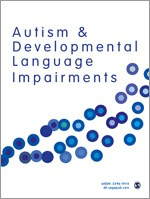
Autism & Developmental Language Impairments
Connecting academia and practice for transformative outcomes.Autism & Developmental Language Impairments is a pioneering peer-reviewed journal published by SAGE Publications Inc that focuses on advancing the understanding of autism spectrum disorders and language impairments across the developmental spectrum. Since its inception in 2016, this open access journal has provided a platform for researchers, practitioners, and educators to disseminate innovative research findings, clinical practices, and theoretical insights, reaching a global audience. The journal is notably indexed in prestigious databases and has established its credibility with a remarkable Rank of Q2 in both Clinical Psychology and Developmental and Educational Psychology as of 2023, solidifying its importance in these vital fields. Based in the United Kingdom, it addresses crucial issues in mental health, reflecting a commitment to fostering advancements that seek to enhance the lives of individuals affected by developmental language impairments. As it converges into its next phase from 2016 to 2024, Autism & Developmental Language Impairments continues to play an essential role in bridging gaps between academia and practice, making it an invaluable resource for researchers, clinicians, and students dedicated to this critical area of study.

Psicologia Clinica dello Sviluppo
Exploring the intersections of theory and practice in psychology.Psicologia Clinica dello Sviluppo, published by SOC ED IL MULINO in Italy, is a noteworthy journal that focuses on the expansive fields of clinical and developmental psychology. Since its inception in 1998, the journal has been committed to disseminating high-quality research that bridges theoretical frameworks and practical applications within these domains. With its ISSN 1824-078X and E-ISSN 1824-078X, the journal provides a platform for scholars to explore critical issues in psychological development and clinical practice. Despite recent rankings placing it in the fourth quartile across both Clinical Psychology and Developmental and Educational Psychology categories, the journal is dedicated to fostering a growing body of knowledge that can influence policy and practice. Researchers, professionals, and students will find valuable insights in its contents, contributing to the advancement of psychology as a science and a profession. The journal accepts submissions and actively encourages contributions that tackle contemporary challenges in the field.
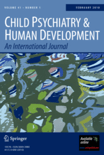
CHILD PSYCHIATRY & HUMAN DEVELOPMENT
Elevating Standards in Developmental and Educational PsychologyCHILD PSYCHIATRY & HUMAN DEVELOPMENT, published by Springer, stands at the forefront of research in the fields of developmental and educational psychology, pediatrics, perinatology, and child psychiatry. With an ISSN of 0009-398X and an E-ISSN of 1573-3327, this esteemed journal has been a vital resource for academics since its inception in 1970. Currently ranked in the Q1 category across its multiple relevant disciplines, it illustrates a significant impact with its Scopus rankings, placing it within the top 13% for pediatrics and child health and the top 18% for developmental psychology. Its comprehensive scope ensures that leading-edge studies, reviews, and discourse are accessible, contributing greatly to the understanding of mental health and developmental processes in children. With no open access option, the journal maintains a commitment to high-quality, peer-reviewed content that is invaluable for researchers, healthcare professionals, and students alike, as they strive to advance their knowledge and practices in child psychology and human development.
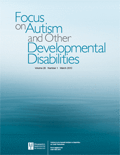
Focus on Autism and Other Developmental Disabilities
Empowering professionals with cutting-edge research.Focus on Autism and Other Developmental Disabilities, published by SAGE Publications Inc, is an esteemed academic journal dedicated to advancing the understanding of autism and related developmental disorders. With a significant publication history dating back to 1986, this journal encompasses a wide range of interdisciplinary research, addressing key areas such as cognitive neuroscience, neurology, pediatrics, and mental health. The journal features a robust peer-review process, ensuring the dissemination of high-quality research critical for professionals in the field. While it is not an open access journal, Focus on Autism offers various access options for academic institutions and individuals, fostering an environment of shared knowledge and collaboration. With its recent categorization in the Q2 and Q3 quartiles across multiple fields within medicine and neuroscience, it stands out as a valuable resource for those looking to explore the complexities of developmental disabilities. Researchers, clinicians, and students alike will find this journal to be an essential platform for the latest findings, theoretical discussions, and clinical implications in the domain of autism and developmental disorders.
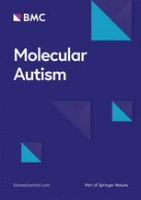
Molecular Autism
Fostering innovation in autism research and therapy.Molecular Autism, published by BMC in the United Kingdom, is a premier open-access journal dedicated to publishing high-quality research on the molecular and genetic factors contributing to autism spectrum disorders. Since its inception in 2010, the journal has established itself as a vital resource for researchers and clinicians, offering insights into the developmental biology, neuroscience, and psychiatric dimensions of autism. With an impressive impact factor and rankings placing it in the Q1 category across multiple relevant fields such as Developmental Biology, Developmental Neuroscience, Molecular Biology, and Psychiatry and Mental Health, it serves as a critical platform for the dissemination of innovative research and interdisciplinary collaboration. The journal encourages open dialogue through its commitment to making research freely accessible, thereby advancing knowledge and fostering advances in the understanding of autism. By bridging diverse disciplines and engaging with cutting-edge research, Molecular Autism aims to enhance our understanding of autism's complexities and inform future therapeutic approaches.
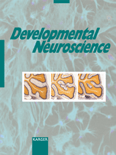
DEVELOPMENTAL NEUROSCIENCE
Unraveling the Mysteries of NeurodevelopmentDEVELOPMENTAL NEUROSCIENCE, published by KARGER, is a vital academic journal dedicated to advancing the field of neurodevelopmental research. Since its inception in 1978, this journal has been instrumental in disseminating high-quality studies that explore the complexities of brain development and function throughout the lifespan. With an impact factor that places it in the second quartile (Q2) of Developmental Neuroscience and Neurology categories, it ranks among the top publications in its field, offering valuable insights for researchers, clinicians, and students alike. Though primarily subscription-based, the journal remains committed to fostering academic discourse and collaboration through its extensive repository of original research articles, reviews, and case studies. The journal is located at ALLSCHWILERSTRASSE 10, CH-4009 BASEL, SWITZERLAND, and its scope spans critical areas of inquiry within developmental neurology, providing a platform for emerging ideas and methodologies. As such, DEVELOPMENTAL NEUROSCIENCE serves not only as a critical resource for seasoned professionals but also as an enriching educational tool for the next generation of neuroscientists.
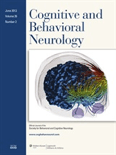
Cognitive and Behavioral Neurology
Elevating Knowledge in Cognitive and Behavioral NeurologyCognitive and Behavioral Neurology is a prominent peer-reviewed journal dedicated to advancing the understanding of cognitive and behavioral aspects of neurological disorders. Published by Lippincott Williams & Wilkins, this journal has established itself as a vital resource for researchers, clinicians, and students in the fields of cognitive neuroscience, neuropsychology, and psychiatry. With an ISSN of 1543-3633 and an E-ISSN of 1543-3641, it offers a robust platform for the dissemination of high-quality research, as evidenced by its positioning in the Q3 quartiles across various categories, including Cognitive Neuroscience and Psychiatry. The journal, which has been actively publishing since 2003, encourages innovative studies that explore the intersection of cognition and behavior in neurological contexts. As a vital contributor to the academic dialogue on these topics, it provides an essential archive of findings and discussions that inform clinical practice and educational approaches, reflecting its commitment to improving patient outcomes and enhancing neurological science.

Education and Training in Autism and Developmental Disabilities
Championing Progress in Autism and Developmental EducationEducation and Training in Autism and Developmental Disabilities is a prominent journal published by the Council for Exceptional Children, focusing on innovative research and insights in the field of autism and developmental disabilities education. With an evolving scope since its inception, the journal emphasizes the importance of evidence-based practices, pedagogical strategies, and interdisciplinary approaches to enhance educational outcomes for individuals with autism and related conditions. Although it currently holds a Q3 category in Developmental and Educational Psychology and is ranked in the Q2 category in Education, it continues to gain recognition with a respectable placement in Scopus rankings—indicating that it plays a crucial role in informing educational practices and policy decisions. Researchers and practitioners can access a wealth of information through its open access options, underscoring a commitment to disseminating knowledge widely. By bridging the gap between research and real-world application, this journal serves as an essential resource for education professionals seeking to advance their understanding and improve the quality of education for neurodiverse learners.